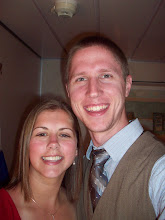Thursday, March 31, 2011
YHWH & His People: A Response to R.W.L. Moberly
However, in v. 11, Moses faithfully reminds YHWH that the people of Israel are his (YHWH’s) chosen people. He responds, “…why does your wrath burn hot against your people, whom you brought forth out of the land of Egypt with great power and with a might hand?” The passage closes with YHWH’s relenting “of the disaster which he thought to do to his people,” indicating, as Moberly writes, “Yahweh’s acceptance of Moses’ plea. Yahweh accepts that Israel is his people and so not to be destroyed or cast off” (Moberly, 50).
As has been stated in previous posts, YHWH allowed for this change of mind by making his judgment dependent upon Moses’ response. In 32:10, YHWH makes a promise to Moses that is almost identical to his promise with Abraham in Genesis 12:3. Yet again, Moses hears and faithfully responds by recalling YHWH’s covenant with Israel (notice he uses the name “Israel” rather than “Jacob”). Moberly writes, “Yahweh’s faithfulness to his promise, to which Moses appeals in v. 13, becomes the reason why Yahweh spares the people…” (50). Furthermore, “It is God’s faithfulness alone which is the basis for forgiveness; and yet this faithfulness is only revealed and made actual when Moses’ bold intercession calls it forth” (51). Therefore, it is both Moses and YHWH together who act as the responsible agents for the future of Israel as YHWH’s people.
Throughout history, God has chosen, at times, to act alone; however, more commonly, as Scripture reveals, God chooses to act in the world through human beings. From the beginning of creation with Adam and Eve to the establishment of God’s covenant with Abraham to the deliverance of God’s people out of slavery in Egypt through Moses to the warnings of judgment and unveiling of mercy through the prophets to YHWH entering the world in the life of a man, God chooses to act, revealing his kingdom and his will to all of creation, through the life of his people. This revelation continues today through the joining of YHWH’s perfect faithfulness alongside the faithful response of YHWH’s people, the church. May the church continue to reveal the faithfulness of YWHW through its faithful response to his kingdom, his will, and his calling into relationship.
Grace to you,
Matt
Friday, March 25, 2011
From Creation to Re-Creation in Exodus
Some have claimed that the plagues are representative of YHWH showing his power over the gods of Egypt (though I think this is a stretch for some of them!). My OT professor, Dr. Shipp, makes the case that the plagues are actually an overturning of creation as YHWH does cosmic battle with Pharaoh (who claims to be a god himself). I think he makes a convincing argument. There are references throughout the first 15 chapters not only to water but back to Genesis and back to creation and chaos. As Dr. Shipp says, "This is what happens when God is at war!"
If it is the case - and I think it is - that the plague narratives are an overturning of creation because of the cosmic battle between YHWH and Pharaoh, then the water motif, culminating at the event of the sea, deals the final crushing blow. It is at the sea where the evil oppressor (represented as Egypt) is swallowed up while God's chosen people (Israel) are delivered and redeemed. The plagues serve as an overturning of creation, culminating in the return to and destruction of "evil" in the waters of chaos. Following YHWH's victory at the final scene of the Exodus, he then restores creation through the redeemed of Israel, culminating in the establishment of the Temple, the meeting place (coming together) of Heaven and Earth.
Looking at the events of the cross, we see a similar pattern. The great theophany takes place as God battles evil one final time, facing death head on. Through the death and resurrection of Christ, he deals the final crushing blow, gaining victory over evil and redeeming his people. Through the redemption of his people in the resurrection of his son, YHWH is restoring all of creation which will culminate in the final coming together of the new heaven and new earth and the swallowing up of evil (see Rev. 21) . This overcoming of evil, restoration of creation, and coming together of the new heaven and earth has already begun and is taking place in the life of the church today.
Grace to you,
Matt
Wednesday, March 23, 2011
Water in Exodus 1-15
· Pharaoh orders the killing of all male Hebrew babies in the Nile (Exodus 1)
· Moses is placed in an ark and hidden in reeds in the Nile (Exodus 2)
· Hebrew form of “Moses” (Moshe) means “drawn out” (of the water)
· Water from the Nile will turn to blood as a sign (Exodus 4)
· Nile is turned to blood as one of the plagues (Exodus 7)
· Israelites are rescued through the sea (Exodus 14)
· Egyptians army is swallowed up by the sea (Exodus 14)
In ancient times, water is associated with chaos (see Genesis 1:2; Genesis 7). Ironically, every time water is linked with the Israelites, it is also linked with redemption (Moses saved in the Nile; name of Moses; Israelites rescued through the sea). When water is connected with the Egyptians, it becomes associated with death (Killing male babies in Nile; Nile to blood plague; Egyptian army drowned in the sea).
This becomes important pastorally: through chaos, God brings redemption to his people; in chaos, God's enemies are swallowed up.
Grace to you,
Matt
